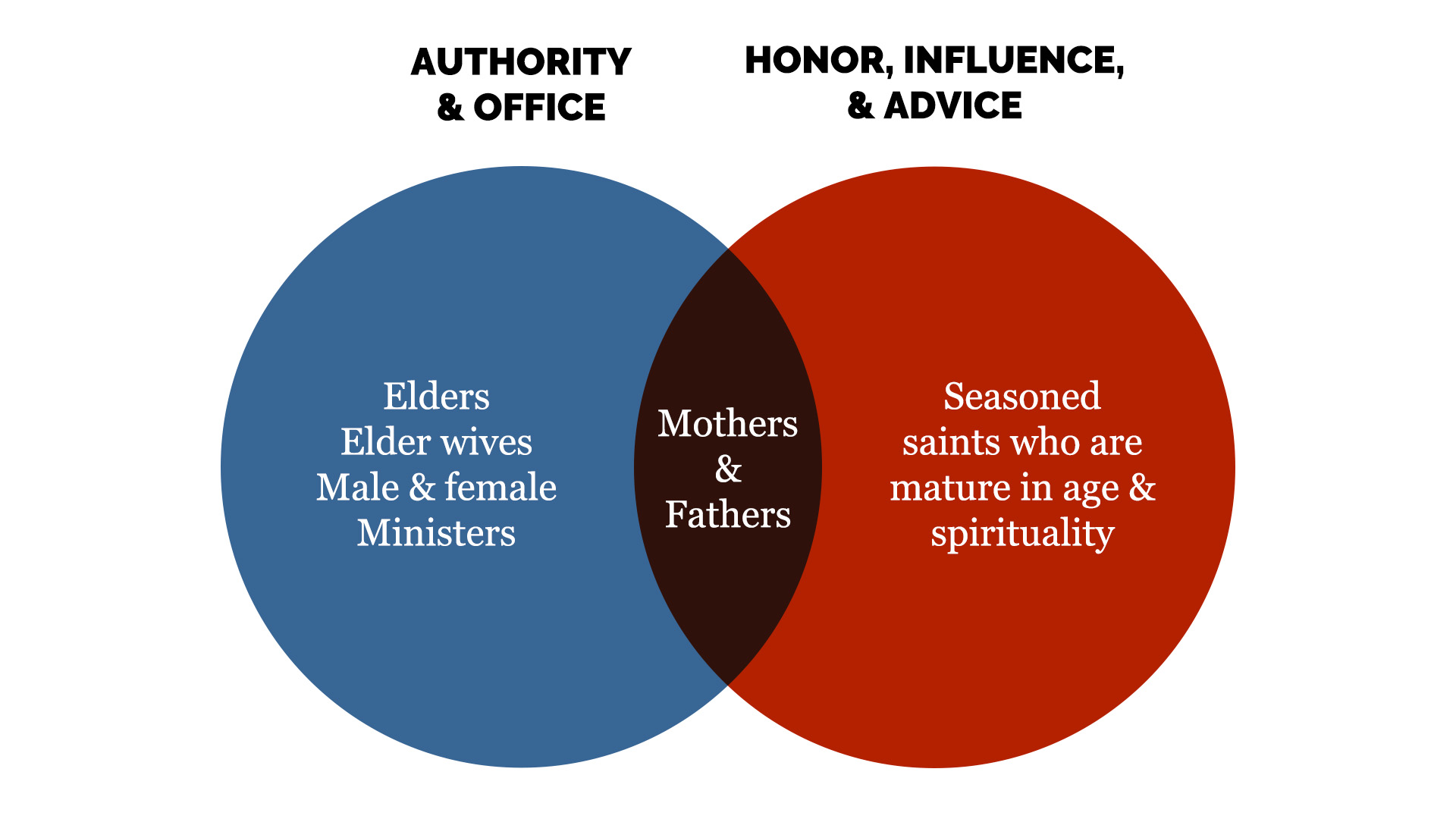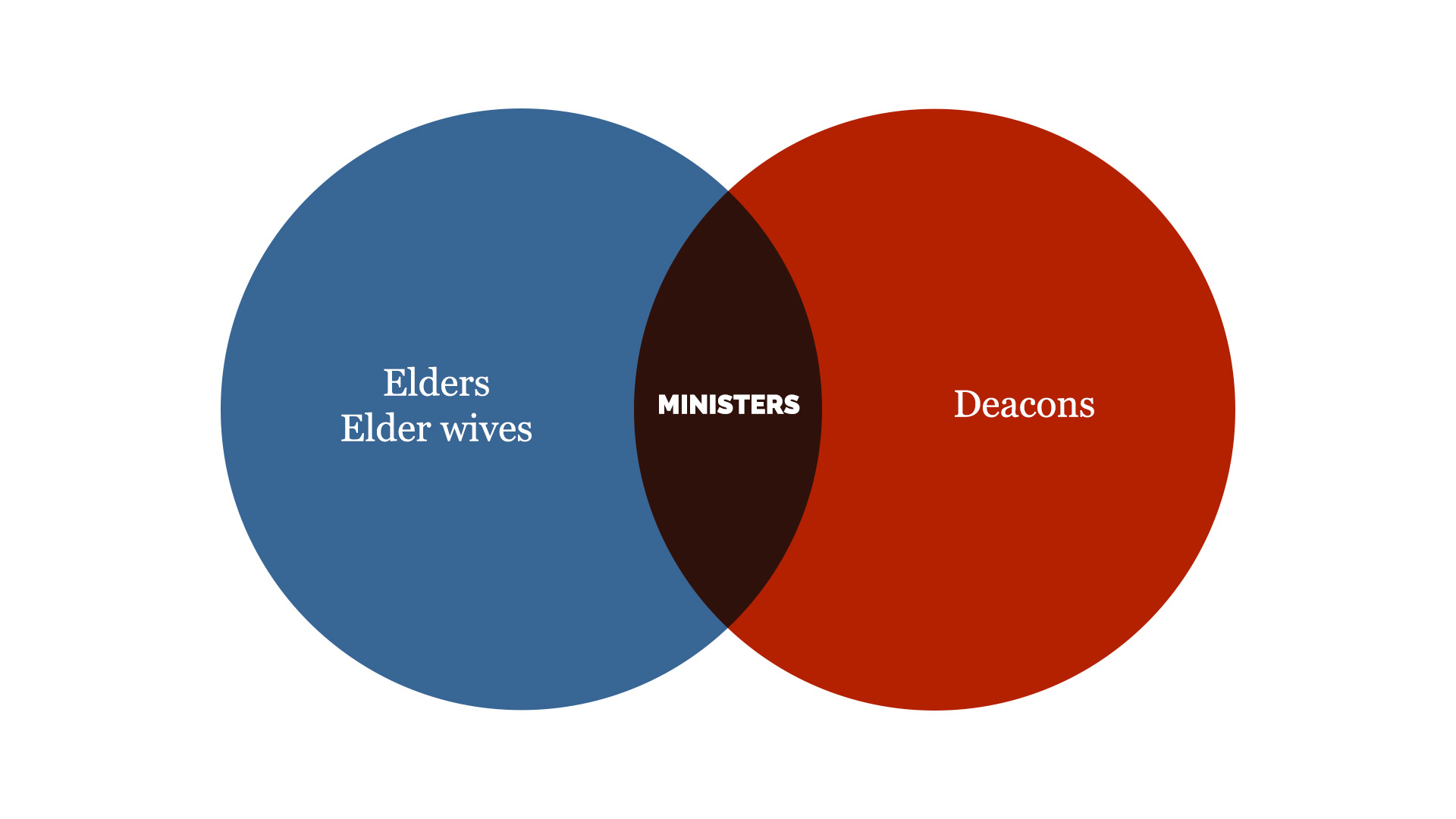We hold to the belief that church structures that resemble more of an institutional hierarchy align more with cultural systems than the covenantal reality portrayed in the New Testament. Our perspective envisions the church primarily as a family, acknowledging the familial needs that necessitate the diversity of gifts God has given to his beloved family through a diversity of people. Consequently, we believe these gifts embodied in men and women, young and old, rich and poor representing all nations, tribes and tongues should be showcased not only in the corporate worship of Sunday mornings (including the pulpit) but across every sphere of discipleship within the church, for the maturity of his family serving as a reflection of His eternal kingdom.
In scripture, the designations “Mothers” and “Fathers” within the church often signify the level of spiritual maturity among certain believers and the nurturing care they provide to the family of God. This concept extends beyond the idea of biological parenthood, emphasizing the provision of paternal and maternal guidance to fellow believers. Both Jesus and Paul conveyed embodying a type of love for the body similar to that of a mother, and the apostle Paul frequently uses fatherly imagery to describe his relationship with the churches
Historically, in certain Protestant traditions, this terminology has been applied to encompass male and female clergy of various ages. But within some traditional African American communities, the terms “Mothers” and “Fathers” specifically denote seasoned saints who are advanced in age, similar to grandparents of the faith. This usage emphasizes the value placed on the spiritual and practical wisdom gained through a long and experienced life. With this in mind, we see the dual implication of the designations.
1 Timothy 5:1–2 underscores the importance of showing honor and respect to older saints within the community, treating them with the same reverence due to a father or mother. Simultaneously, it encourages engagement with younger members as brothers and sisters in the shared family of faith.

Elders, Elder wives, Ministers, and the esteemed seasoned saints holding positions of honor in our community serve as the Mothers and Fathers, some exercising authority (Elders, Elder wives, and Ministers), and others bestowed with honor (Seasoned Saints). The deacons in our community function like caring uncles and aunts who provide love and support to the family. Those actively serving in our community are the represented sons and daughters, the brothers and sisters within our communal family. This familial structure forms the bedrock from which all leadership roles emerge, emphasizing that at the core, we are all brothers and sisters in the family of God.
In the grand tapestry of humanity, the best parts of womanhood and manhood reflect the diverse reality of the triune God in whose image both male and female were created. There are distinct realities that set them apart, equal realities that eliminate hierarchy, and a oneness that unifies us in him.
- Underpinning all, we are often reminded of the encompassing love and authority of God the Father through the accountability and authority placed on men who serve as spiritual fathers in our community.
- Simultaneously, all are enveloped by the tender, nurturing love of the Holy Spirit, which we are reminded of when looking at the nurturing care of many mothers. In the creation narrative women are described as helpers or paracletes, coming alongside to provide support and guidance which is a tangible reminder of attributes associated with the Holy Spirit.
- In a harmonious unity, all individuals are united with the Son, embraced as sons and daughters, and living together as brothers and sisters. This familial bond reflects the divine connection and adoption into the family of God, mirroring the inherent unity within the Godhead.
Thus, the entirety of humanity, in its various phases, paints a picture of the multifaceted God—a God of love, authority, nurturing care, and familial unity. This interconnectedness echoes the profound truth that we are all part of God’s family, joined together under the loving authority of the Father, embraced by the nurturing love of the Holy Spirit, and united as siblings through the redemptive work of the Son.
The Diakonos
In scripture, the word Diakonos has been translated in three different ways; and this will build our leadership framework.
Diakonos
- Definition “one who serves”; “servant”; “attendant”; “agent”; “assistant”
- English Translation Versions
- Servant
- LEB; NASB; NIV; NLT; ESV
- Deacon
- LEB; NIV; NLT; ESV; KJV; NASB
- Minister
- LEB; KJV
Diakonos basically means “servant” or “messenger” in both the New Testament and secular Greek literature. This generic sense is applied to Tychicus, a faithful diakonos in the Lord who delivered Paul’s letters to the churches at Ephesus and Colossae (Eph 6:21 – 22 translated servant in NIV and Minister in ESV; Col 4:7 Translated Minister in both NIV and ESV). The term was later used to designate someone holding an official position of church leadership, often called a deacon (1 Tim 3:8, 12).
Jesus taught that believers should voluntarily be a diakonos for other believers, motivated and inspired by His own example of service (Matt 20:26–28 translated servant in both NIV and ESV). He also used the term to describe the relationship of His followers to Himself (John 12:26 translated servant in both NIV and ESV).
Paul used the term to denote secular government officials as Diakonoi (plural of diakonos) of God (Rom 13:4 ultimately serving God’s agenda as government officials) and false apostles as Diakonoi servants of Satan (2 Cor 11:13–15). He also referred to himself as one who was a diakonos for the transmission of the gospel (Col 1:23 translated servant in NIV and Minster in ESV). All this establishes that the term alone did not necessarily have a sacred or secular connotation.
The use of Diakonos in connection with the office of overseer or elder suggests the role of the deacon in the early church was to assist the overseers or elders in caring for the needs of the church (Phil 1:1; compare Acts 6:1–4). The office of deacon did not carry the same level of authority over the church as that of overseer (see 1 Tim 3:1–13).
1 – Servant
- We consider ourselves a family of missionary servants. We invite all believers in our local church family to transition from mere consumers to participants in God’s mission through the practical means of hands-on service. Servanthood is the entry point for all forms of leadership in the Beloved Community and frames the posture of our hearts as brothers and sisters who lead by committing to serve in some form of ministry that our church offers. Serving within the local church is in addition to the personalized individual ways the Lord might call said believer to serve others in and outside of our local body of believers.
- Matthew 20:25–28 (NLT): But Jesus called them together and said, “You know that the rulers in this world lord it over their people, and officials flaunt their authority over those under them. But among you it will be different. Whoever wants to be a leader among you must be your servant, (diakonos) and whoever wants to be first among you must become your slave. For even the Son of Man came not to be served but to serve others and to give his life as a ransom for many.”
2 – Deacon
- From within the pool of local servants, we select and call some to serve in the office of Deacon. A Deacon is one of two offices within the church. Scripture describes this office as being held by both male and female members of the body. Deacons work closely with local church elders and serve as an extension of their leadership assisting with discipleship, pastoral care, and counsel, teaching, guiding, and protecting the flock. Deacons also assist with the practical needs of the body while helping to preserve the unity of the family. Deacons are faithful members of the community who help reflect the motherly love of (the spirit) while upholding the structure and authority of the (Father) that are both embodied in Jesus (the son).
- 1 Timothy 3:7–11 (NIV): He must also have a good reputation with outsiders, so that he will not fall into disgrace and into the devil’s trap. In the same way, deacons are to be worthy of respect, sincere, not indulging in much wine, and not pursuing dishonest gain. They must keep hold of the deep truths of the faith with a clear conscience. They must first be tested; and then if there is nothing against them, let them serve as deacons. In the same way, the women are to be worthy of respect, not malicious talkers but temperate and trustworthy in everything.
3 – Minister
- Within our local group of Deacons, we identify and consecrate individuals, both men and women, with a specific calling for the ministry of the word. Those chosen for this particular purpose undergo public recognition, licensing, and commissioning for the Apostolic ministry as pastors, evangelists, teachers etc. Their responsibilities encompass a range of activities, such as teaching, preaching, evangelism, and shepherding. Ministers operate at a level of authority between Deacons and Elders, as they assume an additional layer of accountability, actively participating in the nurturing and guidance of our community as mothers and fathers. This involves working more closely with the elders in a collaborative effort to provide support and leadership.
- Philippians 1:1 (ESV): To all the saints in Christ Jesus who are at Philippi, with the overseers and deacons:
- Ephesians 3:7 (ESV): Of this gospel I was made a minister according to the gift of God’s grace, which was given me by the working of his power.
- Ephesians 4:11–12 (ESV): And he gave the apostles, the prophets, the evangelists, the shepherds and teachers, to equip the saints for the work of ministry, for building up the body of Christ

4 – Elder
- From within the pool of local Ministers, we select and call some to serve in the office of Elder. This is a weighted role specifically held by men symbolizing spiritual fathers in the community. These fathers function in the spirit and accountability of Christ.
Ephesians 5:21–30 (NIV): Submit to one another out of reverence for Christ. Wives, submit yourselves to your own husbands as you do to the Lord. For the husband is the head of the wife as Christ is the head of the church, his body, of which he is the Savior. Now as the church submits to Christ, so also wives should submit to their husbands in everything. Husbands, love your wives, just as Christ loved the church and gave himself up for her to make her holy, cleansing her by the washing with water through the word, and to present her to himself as a radiant church, without stain or wrinkle or any other blemish, but holy and blameless. In this same way, husbands ought to love their wives as their own bodies. He who loves his wife loves himself. After all, no one ever hated their own body, but they feed and care for their body, just as Christ does the church— for we are members of his body.
- Ephesians 5:21–30 (NIV) instructs believers to “Submit to one another out of reverence for Christ.” The passage goes on to outline specific roles within marriage, comparing the husband’s role to the headship of Jesus. This analogy is extended to the office of Elder, drawing parallels between men who function as fathers and love the church in a manner similar to husbands loving their wives.
- Headship as a Reflection of Jesus (Authority with a Purpose): The authority vested in Elders’ headship is framed as a means to love the church, involving sacrificial giving for the overall flourishing of the body. This authority is exercised by applying the word of God to address the spiritual needs of the church, aiming for its cleansing and sanctification. Notably, the Elder doesn’t view this power and authority as a tool for self-interest but as a vehicle to serve the church, which is regarded as God’s bride. The Elder serves with the same diligence and care that one would employ for self-service. Consequently, any abuse of power and authority is seen as an act of self-harm.
- Accountability for Discipleship: Accountability in the role of Elders extends to the broader discipleship of the church, ensuring the cultivation and release of all gifts bestowed upon the church for its maturity. Elders function as representatives of Jesus, standing in proxy for His loving care for His bride, the church. In this way, they symbolize and embody the profound responsibility of shepherding the community with the same love and dedication modeled by Christ for His church.
- Titus 1:5–9 (ESV): This is why I left you in Crete, so that you might put what remained into order, and appoint elders in every town as I directed you— if anyone is above reproach, the husband of one wife, and his children are believers and not open to the charge of debauchery or insubordination. For an overseer, as God’s steward, must be above reproach. He must not be arrogant or quick-tempered or a drunkard or violent or greedy for gain, but hospitable, a lover of good, self-controlled, upright, holy, and disciplined. He must hold firm to the trustworthy word as taught, so that he may be able to give instruction in sound doctrine and also to rebuke those who contradict it.
- 1 Peter 5:1–4 (NIV): To the elders among you, I appeal as a fellow elder and a witness of Christ’s sufferings who also will share in the glory to be revealed: Be shepherds of God’s flock that is under your care, watching over them—not because you must, but because you are willing, as God wants you to be; not pursuing dishonest gain, but eager to serve; not lording it over those entrusted to you, but being examples to the flock. And when the Chief Shepherd appears, you will receive the crown of glory that will never fade away
Elder Wives
- In a healthy and whole family dynamic, the presence of both mothers and fathers is crucial. Elders recognize the importance of seeking wise counsel from spiritually mature women within the church, starting with their own wives. Elders and their wives collaborate in a family-style leadership, actively inviting wisdom and input into the life of the community. This joint leadership of elders and their wives represents the first layer of Mothers and Fathers in the spiritual family, embodying the principle of mutual submission as outlined in Ephesians 5:21.
- The role of the wives of Elders operates under the authority of the Elders and serves as an extension of that authority. They symbolize and continually remind the Elders and community of “the church” as “the bride of Christ”. This constant reminder underscores the practical and spiritual ways Elders are called to love and serve their natural wives, exemplifying the sacrificial love and service modeled by Jesus for the church.
- Additionally, the wives of Elders serve as symbols of the Holy Spirit, referred to as “The Helper” in the gospel narrative. This symbolism aligns with the description of wives in Genesis 2:18, where God provides a helper suitable for man. It also resonates with the words of Jesus in John 14:16–17, describing the Spirit of truth as another Helper who dwells with and is in believers. Thus, the wives of Elders symbolize the supportive role, assistance, and companionship provided by the Holy Spirit, reinforcing the interconnected relationships within the spiritual family.
- Genesis 2:18 (NIV): The Lord God said, “It is not good for the man to be alone. I will make a helper suitable for him.
- John 14:16–17 (ESV): And I will ask the Father, and he will give you another Helper, to be with you forever, even the Spirit of truth, whom the world cannot receive, because it neither sees him nor knows him. You know him, for he dwells with you and will be in you.
